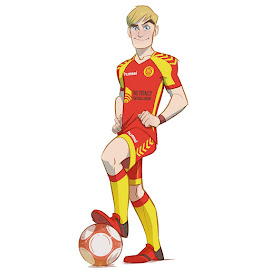
Which team do you support? They’ve always been your one and only right? Ever since whatever it was that occurred – your first match; seeing a cool kit on The Big Match whilst stuffing your face with Opel Fruits; copying your best mate – that sparked your lifelong love affair, this club has always held an exclusive place in your heart?
Wrong.
Or at least, for most of us anyway. Because if you were a small boy between the years 1954-2001 (like I say, most of us), and if you enjoyed comics (see previous brackets), then odds on there was another allegiance. A sort of trainer club, that taught you the discipline, loyalty and devotion required to follow the same outfit every week come rain or shine, miserable defeat or glorious victory.
Melchester Rovers first appeared in Tiger magazine in the mid-fifties and became a regular, much-loved fixture there for over twenty years until the eponymous Roy of the Rovers launched in 1976.
The early side contained two raw recruits from the reserves – schoolboy friends Roy Race and Blackie Gray – who would go on to become key figures at the club and were instrumental in leading the side to ten league titles, ten FA Cup victories, and three European Cup triumphs.
Roy certainly had an eventful life both on and off the pitch. During his time with the club – that spanned over half a century – he was shot, spent time in a coma following a helicopter crash, and lost his devoted wife Penny in a car accident. He also survived the atrocious terrorist explosion in Basran in 1986 that ripped apart his talented side that had only recently broken the league record of going twelve games without conceding a goal. Eight players died that awful day, several of whom came through Melchester’s youth system, including Noel Baxter, one of the most naturally gifted defenders ever to grace the game.
Yet, although Roy Race came to symbolise Rovers, the club existed long before he was even an idea in the artist’s pencil.
Founded in 1885 on the River Mel by the Crib Lane Freight Company they would secure their first piece of silverware twenty years later – a successful F.A Cup campaign skippered by none other than Billy Race, Roy’s great grandfather.
Mel Park was built soon after, a ground that hosted countless nights of gripping drama and more stories than Dustin Hoffman could possibly eulogize about on top of a New York building. Sadly it succumbed to an earthquake in the late-eighties. Just six years earlier it had become Britain’s first all-seater stadium, its 56,000 capacity often packed out with silent, but flag waving, supporters….apart from two quite chatty guys who clearly saw themselves as amateur commentators.
In 2001 Melchester Rovers, to all extents and purposes, quietly folded when the publication that housed its strips during the latter years, Match of the Day, also fell from existence.
In over a hundred years this incredible – often incredulous – club gave millions of children, bridging many generations, twenty minutes of joy every week before school. Weetabix hardening and forgotten in a nearby bowl they absorbed themselves in a world where one club never, not once, achieved mediocrity. It was either a title race or relegation. Where every foreign player sported a rather natty pencil-thin moustache. And where Geoffrey Boycott was chairman for several years.
Rovers were one of the most successful British club sides of all time and in tribute to this fine institution here is what we consider to be their finest XI.
GK – Tubby Morton
Although Charlie ‘the cat’ Carter pushes him close it can only be Tubby. A long-standing stalwart between the Mel Park sticks the England international kept the deadliest Tynecaster and Cranville attackers at bay for nearly twenty years.
Made an emotional return to first-team football several years after his retirement but alas the endearing chubbiness had ballooned by then to full-on fatty. In his prime though the safest two-dimensional hands around.
RB – Ben Galloway
In many ways Galloway’s magnificent career was the prototype for Races. A lengthy and highly-acclaimed spell as player/captain (during the 1930s and 40s) before moving upstairs to guide the mighty Rovers to further glory. Although the club had other managers, most notably Tony Storme, the firm but fair Galloway will always be the ‘gaffer’. He is included in this team entirely on playing merit however due to being an exceptional attacking full-back, forming a long and fruitful partnership down the right flank with Jimmy Potter.
LB – Duncan Mackay
It is a common misconception held by many that Johnny Depp based his character in Pirates of the Caribbean on aging rocker Keith Richards. In actual fact Depp, a renowned anglophile, was an avid reader of British comics during the eighties and was particular impressed by Rover’s hot-headed and tenacious Scottish full-back. Transfer-listed on a number of occasions yet always thoroughly committed to the red and yellow cause.
CB – Noel Baxter
An exceptionally gifted stopper Baxter came through the ranks yet initially found his innate shyness hard to overcome. He once fled the city life and camped in the Brecon Beacons until Race tracked him down and persuaded him to return.
Once he’d matured and gained confidence however Baxter developed into one of the most natural and stylish defenders the British game had ever seen. In time he even became the dressing room joker.
The popular and likeable England international was killed in Basran alongside seven of his team-mates. Gone but never forgotten.
CB – Lofty Peak
Solid, tough as teak, and ever dependable, Peak began his career at Kingbay before establishing himself as the mainstay of the stubborn Melchester back-line throughout one of their most successful eras.
Very much in the John Terry mould of defending yet it is inconceivable to even imagine the rugged Peak crying like a little girl over a missed penalty.
RM – Mervyn Wallace
Even today there are cartoon full-backs who still have cartoon nightmares about the legendary ‘Merv the Swerve’. Blessed with searing pace, trickery in abundance, and a strike ratio that was the envy of many a centre forward, Wallace had the lot.
Eventually retired to join the backroom staff at Melchester, twice stepping in as caretaker manager.
CM – William ‘Blackie’ Gray
Calmness personified Gray was a gentleman locksmith of defences for many years. A lifelong chum of Race, he began his career up front before settling into a deeper, more influential, role during the latter stages of his career. Never put a foot wrong apart from falling hopelessly in love with French film star Suzanne Cerise just prior to the 1964 European Cup final.
His name is even included in a line from the official club song – ‘That was a sizzler from old Blackie Gray!’ The preceding line has the crossbar fall onto the hapless opposition goalkeeper’s head.
CM – Jimmy Slade
The playmaker of the side, Slade could also dish it out when needs must with a volatile temperament forged from his tough scrap-yard upbringing. His surname is quite ironic considering that he had hair like a Bay City Roller.
LM – Lord D’Arcy Plantagenet ‘Jumbo’ Trudgeon-Marclay
Would be worth a fortune in today’s market though that would mean little to Jumbo who was already a multi-millionaire land owner. A genuine Lord he resided at Fallowfield Manor, on the outskirts of Melchester, and never took one penny in wages from the club. He played purely for the thrill and adventure, a probing and dangerous winger who liked to cut inside and get in on the glory. Was a prominent member of the great Melchester side of the early-seventies that secured two European Cup triumphs Jumbo is rightfully considered a club legend.
CF – Vic ‘Superbrat’Guthrie
The initiation ritual for any new player at Mel Park was to bow three times to the bronzed statue of George Armstrong, the legendary manager of the 1930s. Guthrie refused and from there his reputation as a petulant trouble-maker was set for the remainder of his tragically short career. Blessed with sublime gifts he formed a brief prolific partnership with the avuncular Race before dying amidst the rubble of the Basran bomb attack.
In hindsight he probably should have bowed.
CF – Roy Race
The main man. The guvnor. Roy overcame more traumas and heartbreak than a single individual should ever be expected to endure yet remained approachable, integrity intact, to the very end. His career drew to a close in 1992 when he lost his leg in a helicopter crash. He also lost his wife, was kidnapped on numerous occasions, and was shot by a failed actor named Elton Blake. Despite all this his hair remained luscious and blonde throughout. Kudos.
During his illustrious career he scored more goals than Pele and won every trinket under the sun before going on to manage Melchester twice, AC Monza, and England. Look up the word ‘legend’ in the dictionary and admire the blonde locks.
Subs –
Martin Kemp
Yes, that Martin Kemp. He of the dodgy quiff and weird, whispery voice. Melchester briefly signed two members of Spandau Ballet whilst they were at their popular peak in the mid-80s. So true, funny how it seems. Kemp was, by all accounts the better player than his band-mate Steve Norman
Rocky Race
Roy’s only son who continued the closely-linked Melchester/Race legacy. Aptly, given his name, the young Race had a rather….erm..rocky relationship with his famous father, blaming him for the death of his mother in a car crash whilst on holiday. Roy was driving that day yet the circumstances were never fully resolved.
http://daisycutter.comule.com/?p=549













Δεν υπάρχουν σχόλια:
Δημοσίευση σχολίου